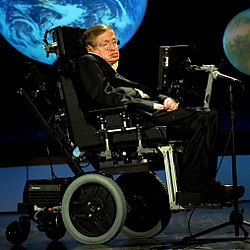Stephen Hawking, one of the most brilliant theoretical physicists of the 20th and 21st centuries, made groundbreaking contributions to our understanding of the universe. Despite being diagnosed with a debilitating disease, his extraordinary intellect and perseverance made him an icon in the world of science and beyond. His life and work have inspired millions, not just for his intellect, but for his resilience in the face of adversity. This article delves into Stephen Hawking’s Wiki biography, his achievements, and his contributions to science, offering an overview of the profound impact he had on the world.
Early Life and Education
Stephen William Hawking was born on January 8, 1942, in Oxford, England, exactly 300 years after the death of Galileo Galilei, one of the founders of modern science. Hawking’s parents, both highly educated, moved to Oxford during World War II while his father, Frank Hawking, worked as a medical researcher. Stephen had two younger sisters and one adopted brother.
Though he initially struggled academically, Hawking’s interest in science developed early in life. He was an inquisitive child, asking questions about the universe that sparked a curiosity for understanding the world around him. He later attended University College London, where he earned his first degree in Physics in 1962. Afterward, Hawking pursued graduate studies at the University of Cambridge, where he began his research into cosmology and black holes.
Diagnosis and Challenges
In 1963, when Stephen was just 21 years old, he was diagnosed with amyotrophic lateral sclerosis (ALS), a motor neuron disease that causes the progressive degeneration of the motor neurons controlling voluntary muscles. At the time, doctors gave him a prognosis of only two years to live. However, Hawking defied these odds and continued his scientific work for decades, eventually becoming one of the most renowned scientists in the world.
Despite losing much of his physical mobility, including the ability to speak, Hawking developed ways to communicate through a speech-generating device that he operated using a cheek muscle. This perseverance, coupled with his brilliant mind, led him to achieve remarkable feats in science, making him an enduring symbol of determination and intellectual greatness.
Scientific Achievements and Theories
Stephen Hawking’s work in the field of theoretical physics, particularly his research on black holes and the origins of the universe, has revolutionized our understanding of cosmology. Some of his most important contributions are outlined below:
1. Hawking Radiation
Perhaps one of his most famous contributions to science, Hawking radiation is the theoretical prediction that black holes are not completely black, but instead emit radiation due to quantum effects near the event horizon. This groundbreaking discovery was a combination of principles from both quantum mechanics and general relativity. It suggested that black holes can lose mass and energy, leading to their eventual evaporation over incredibly long periods of time. This theory sparked new debates and research about the nature of black holes and their behavior.
2. The Big Bang Theory and Singularity Theorems
Stephen Hawking’s work on the Big Bang Theory and the nature of singularities (points where the gravitational forces are so strong that space and time become infinitely distorted) has been instrumental in modern cosmology. Along with mathematician Roger Penrose, Hawking showed that the universe likely began as a singularity, a point of infinite density, during the Big Bang. Their joint work on singularity theorems has provided crucial evidence for the Big Bang model of the universe’s origin.
3. The No Boundary Proposal
In 1983, Hawking introduced the no boundary condition of the universe in collaboration with physicist James Hartle. This theory posits that the universe does not have boundaries or edges and that time itself can be treated as another dimension of space. According to this proposal, the universe is finite but has no boundaries, much like the surface of a sphere. The theory suggests that the universe began without a clear beginning, with time and space both emerging from a quantum state.
4. Black Hole Information Paradox
Hawking also contributed to the black hole information paradox, a famous problem in theoretical physics. According to the laws of quantum mechanics, information cannot be destroyed, but black holes seemed to be capable of destroying information about the matter they consume. Hawking’s work on the topic led to decades of debate, and he later revised his stance, suggesting that information might be encoded on the event horizon of a black hole.
Notable Publications and Books
Stephen Hawking’s academic work was highly influential, but he also made science accessible to the general public through his writings. His most famous book, “A Brief History of Time” (1988), became an international bestseller and introduced complex scientific concepts, such as black holes, the Big Bang, and quantum mechanics, to a wider audience. The book’s success cemented his status as not only a brilliant scientist but also an effective communicator.
Other notable books by Hawking include:
- “The Universe in a Nutshell” (2001), which further explores the nature of space and time.
- “The Grand Design” (2010), co-authored with physicist Leonard Mlodinow, which examines the role of God in the creation of the universe.
- “Brief Answers to the Big Questions” (2018), which addresses some of the most profound questions about life, the universe, and our future.
Hawking’s books made science more approachable, and they inspired countless people to delve into the mysteries of the universe.
Awards and Honors
Stephen Hawking’s brilliance did not go unrecognized. Over his long career, he received numerous awards, honors, and distinctions. Some of the most notable include:
- Copley Medal (2006) – awarded by the Royal Society for outstanding achievements in scientific research in any branch of science.
- Presidential Medal of Freedom (2018) – the highest civilian honor in the United States.
- Wolf Prize in Physics (1988) – for his contributions to the understanding of the universe.
Although Hawking did not win a Nobel Prize, many consider his work on black holes, Hawking radiation, and cosmology to be deserving of such recognition.
Personal Life and Legacy
Hawking’s personal life was marked by both challenges and achievements. He was married twice—first to Jane Wilde, with whom he had three children, and later to Elaine Mason, a nurse who cared for him during the later years of his life. His marriages and family life were often subject to media attention, especially during his battle with ALS.
Stephen Hawking’s legacy is profound. His contributions to science have altered the way we understand the universe, and his determination in the face of a debilitating illness continues to inspire people worldwide. Despite facing tremendous personal and physical challenges, Hawking’s work and passion for knowledge never wavered. His ability to explain the most complex aspects of science to a wide audience made him a figure beloved by scientists and the general public alike.
Stephen Hawking’s Death
Stephen Hawking passed away on March 14, 2018, at the age of 76, leaving behind a legacy that continues to shape the field of theoretical physics. His work on the nature of black holes, the Big Bang, and the very fabric of the universe will influence generations of scientists and thinkers. Hawking’s profound insights into space, time, and the cosmos ensured his place as one of the greatest minds of our time.
Conclusion
Stephen Hawking’s life and career stand as a testament to human perseverance and intellectual brilliance. Despite facing the physical limitations imposed by ALS, he made profound contributions to our understanding of the universe. His work has reshaped the fields of cosmology and theoretical physics, and his legacy continues to inspire both scientists and non-scientists alike.
Through his books, theories, and public appearances, Stephen Hawking made science accessible to everyone, forever changing the way we view our universe. His legacy is one that will endure, inspiring future generations to explore the wonders of the cosmos with the same curiosity, resilience, and dedication that defined his own remarkable life.















